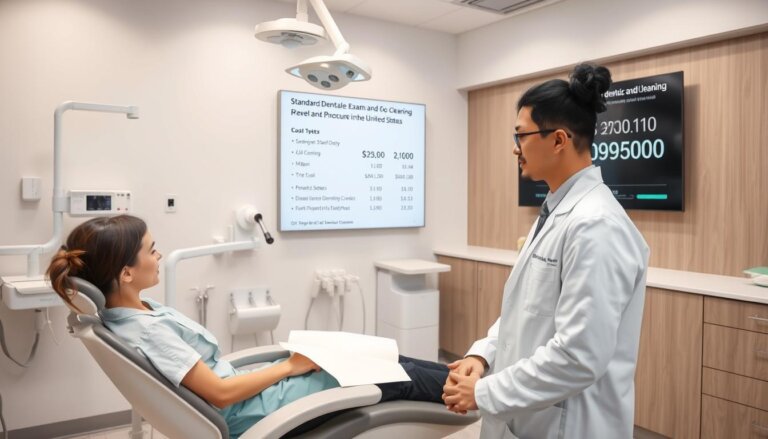Can I Get a Dental Cleaning While I’m Pregnant?
Did you know that about 60% of expecting people face gum swelling due to hormone changes? This raises a big question: Can I get a dental cleaning while I’m pregnant?
The American Dental Association and the American College of Obstetricians and Gynecologists say regular checkups are safe and important. A routine cleaning stops plaque buildup, keeping gums healthy. They suggest seeing a dentist every trimester to keep both mom and baby healthy.
Key Takeaways
- Routine cleanings help prevent gum disease in pregnant women.
- The American Dental Association endorses checkups at all stages.
- Hormonal changes can increase plaque buildup and gum inflammation.
- Consistent assessments lower the risk of oral complications.
- Expectant mothers can safeguard their health and their baby’s well-being.
Understanding Dental Health During Pregnancy
Pregnancy brings many changes that affect our teeth and gums. Hormones can make our gums more sensitive. This means we need to take extra care of our teeth during this time.
Seeing your dentist regularly is key. Hormonal changes can cause swollen gums and tooth pain. But, with regular check-ups, we can avoid serious problems.
Importance of Oral Health for Expecting Mothers
Healthy gums and teeth are important for pregnant women. Dentists suggest gentle brushing and special cleaning methods. These steps help keep you and your baby healthy.
Common Dental Issues in Pregnancy
About half of pregnant women get gingivitis, which causes gum inflammation and bleeding. Regular dental care helps prevent this. It also makes teeth stronger and reduces sensitivity.
| Condition | Potential Impact |
|---|---|
| Gingivitis | Gum tenderness and bleeding |
| Periodontitis | Deep gum damage influencing long-term oral health |
| Tooth Sensitivity | Heightened reaction to hot or cold foods |
Safety of Dental Cleanings
Routine oral evaluations help keep smiles healthy and prevent problems during pregnancy. Experts say it’s key to keep gums and teeth in top shape. This is good for both mom and baby’s health.
This approach fits with today’s dental care for pregnant women. It stops issues early on.
Guidelines from Dental Associations
The American Dental Association and the American College of Obstetricians and Gynecologists say X-rays and local anesthetics are safe. They base this on studies and the need for early prevention. Important steps include:
- Scheduling regular cleanings to detect early signs of gum inflammation
- Using protective aprons during imaging procedures
- Informing dental teams about any related health changes
Risks and Considerations
Experts tell pregnant people to share any concerns, like morning sickness. They make sure dental work is safe and comfortable. This way, dental care is both effective and gentle.
Benefits of Dental Cleaning During Pregnancy
Regular dental checkups and cleanings are key for keeping your mouth healthy. Studies show that pregnant women who get regular dental exams can lower their risk of serious gum problems. This helps keep overall health stable, following pregnancy dental cleaning guidelines.
Dental visits include removing plaque, polishing teeth, and checking for hidden problems. These steps help keep teeth surfaces healthy. This is important because hormonal changes during pregnancy can make gums more sensitive.
Prevention of Gum Disease
Deep cleanings can prevent gingivitis and reduce plaque. This is important in a changing mouth environment. Early treatment helps control inflammation, making it less painful for pregnant women.
Reducing Pregnancy-related Dental Issues
Being proactive can stop infections from spreading to other parts of the body. Removing tartar and thorough exams help prevent complications. This supports healthy prenatal and postpartum periods, following pregnancy dental cleaning guidelines.
Timing of Dental Visits
Getting the timing right is key for pregnant women to keep their teeth healthy. Each stage of pregnancy affects how comfortable you might feel at the dentist. Most experts say non-urgent dental work can be done at any time, but the second trimester is best.
Being proactive means tackling urgent issues quickly to avoid infections. Some people plan their dental visits with their healthcare provider. This helps manage energy levels and nausea.
First Trimester Considerations
Nausea or tiredness can make long dental visits hard. Some opt for quick check-ups early on, saving more detailed care for later. But, don’t ignore severe tooth pain or decay, as it can lead to bigger problems.
Second and Third Trimester Recommendations
The second trimester is often the best time because morning sickness is less and you can sit comfortably in the dentist’s chair. It’s a good time for fillings or deeper cleanings. Later on, short visits are better if lying back is hard. Talking to both your dentist and healthcare provider helps find the best time for you.
Types of Dental Procedures
Keeping your mouth healthy during pregnancy is key for your health and your baby’s. Most experts say you should get regular check-ups and cleanings. They also suggest fillings or root canals if you need them.
Dentists will remove plaque, check your gums, and fix any problems early. They usually wait to do cosmetic work until after you’ve had your baby, unless it’s really urgent.
Standard Cleanings vs. Advanced Procedures
Standard cleanings remove tartar and polish your teeth, making them feel new. More serious procedures, like treating gum disease or fixing cavities, are for bigger problems. Dentists use safe local anesthetics to make sure you’re comfortable.
What to Expect During a Cleaning
A cleaning will remove plaque, check for cavities, and look at your gums. They might take X-rays, but they use special shields to protect your belly and thyroid. This careful approach helps keep your mouth healthy and lowers risks later on.
| Procedure | Focus | When Recommended |
|---|---|---|
| Standard Cleaning | Plaque removal, tooth polishing | Routine visits |
| Advanced Procedure | Periodontal or restorative treatment | When infection or decay is detected |
Anesthetics and Medications
Pain relief is key when we talk about dental cleanings during pregnancy. Local anesthetics like lidocaine are safe for most dental work. Choosing between mild sedation and general anesthesia depends on the mother’s health.
Safe Options for Pain Management
Doctors often pick short-acting meds to protect the baby. They might talk to an obstetrician before giving antibiotics or pain meds. Some over-the-counter pain relievers, like certain acetaminophen, are okay for short use.
- Talk about your pain level with your dentist before the visit.
- Keep an eye on how much and how often you take any meds.
- Find out if the meds could mix with your prenatal vitamins.
Avoiding Certain Medications
Some strong anti-inflammatory drugs can be risky in late pregnancy. A team effort between dentists and prenatal care helps find safer options. This shows how important it is to choose the right meds for both mom and baby.
| Medication | Considerations |
|---|---|
| Acetaminophen | Commonly recommended in moderate doses |
| Lidocaine (with or without epinephrine) | Accepted as safe for most routine dental procedures |
| Certain Antibiotics | Often used after consulting with an obstetrician |
Communicating with Your Dentist
Talking openly makes dental visits more comfortable. It lets dentists adjust their approach for pregnant women. This ensures safety and comfort during dental check-ups.
Discussing Your Pregnancy Status
Telling your dentist about your pregnancy is key. They can adjust the dental chair to ease strain on your spine and pelvis. This helps prevent discomfort and keeps blood flow good.
They also use protective gear during X-rays. This protects both you and your baby.
Importance of Sharing Health History
Telling your dentist about your health is just as important. Conditions like gestational diabetes or high blood pressure affect treatment plans. A full health history helps the dentist work with other doctors for your safety.
This approach makes dental visits more comfortable. It also helps ensure a healthy outcome for you and your baby.
Alternatives to Traditional Dental Cleanings
Some people might need new ways to keep their teeth clean while pregnant. This time can make teeth more sensitive. So, they look for gentle ways to protect themselves and their baby.
Everyday routines and careful planning can help during these months. Some mouthwashes can make teeth stronger. Others help cut down on plaque.
At-Home Dental Care Tips for Pregnant Women
Being proactive can help keep teeth and gums healthy. Here are some tips:
- Brush at least twice a day with a soft-bristled toothbrush.
- Use fluoridated toothpaste for extra protection against cavities.
- Floss gently to get rid of hidden food bits.
- Ask about fluoride mouthwash to strengthen enamel.
Professional Cleanings Postpartum
After the baby arrives, many moms go back for a detailed checkup. This visit helps fix any issues and starts good habits for the whole family. Getting a thorough exam shows dedication and care.
Oral Hygiene Practices for Pregnant Women
Expecting mothers often wonder, Can I get a dental cleaning while I’m pregnant? Healthy routines are key during pregnancy. Some may find brushing hard due to sensitive taste or a gag reflex. Using mild-flavored toothpaste and alcohol-free mouthwash can help.
Rinsing with water or a mild baking soda solution can help after morning sickness. This keeps the mouth fresh and supports gum health.
Recommended Toothpaste and Mouthwash
Choosing toothpaste with milder flavors can help with nausea. Alcohol-free mouthwashes also reduce dryness and irritation. This keeps your teeth and gums healthy.
Flossing Techniques
Gentle flossing is important to prevent food from getting stuck. There are tools that make it easier:
- Floss picks for easy handling
- Water flossers that reduce manual coordination
- Soft, waxed floss for tighter spaces
Being careful with flossing helps keep your mouth healthy. It’s important for your overall health, too.
Nutrition and Dental Health
Eating a balanced diet is key for overall health. It makes teeth stronger and keeps the mouth healthy during pregnancy. This is very important for dental care during this time.
Calcium and vitamin D are good for bones in pregnant women and help the baby grow. Vitamin C also keeps gums healthy. Eating less sugar and more nutritious foods helps prevent tooth damage.
Foods Beneficial for Oral Health
Leafy greens, dairy, and lean proteins are great for gums and fighting plaque. Here are some good choices:
- Dark, leafy greens packed with minerals
- Low-fat dairy giving calcium
- Citrus fruits in moderation for vitamin C
Hydration’s Role in Dental Care
Drinking water helps keep the mouth clean. It washes away food and acids that harm teeth. Combining this with dental cleanings is a smart way to care for teeth during pregnancy.
Dealing with Dental Anxiety
Anxiety can stop pregnant people from getting the oral care they need. Soft music or mindful breathing can help calm nerves before a dental visit. This calmness helps with thorough checkups, keeping dental hygiene in check for expectant mothers.
Strategies for a Calm Dental Visit
Some like to schedule early appointments to reduce stress. Others take short meditation breaks or enjoy soothing scents in the waiting area. Knowing what each procedure is about can also lessen fear and build trust with the dental team.
Support Systems and Resources
Having someone by your side can make a big difference. Partners, relatives, or birth coaches can offer the right words at the right time. Talking openly with the dentist creates a supportive space, boosting confidence during pregnancy.
| Technique | Benefit |
|---|---|
| Aromatherapy | Encourages relaxation and reduces anxious thoughts |
| Guided Breathing | Helps stabilize heart rate and quiet mental tension |
| Companion Presence | Boosts emotional comfort and trust |
Dental Insurance Considerations
Insurance can help with the costs of dental care. Pregnancy dental cleaning guidelines stress the importance of regular check-ups. But, the cost can be a big worry. Many insurance plans offer benefits for tooth and gum care, helping pregnant women keep their teeth healthy.
Coverage for Pregnant Women
Many insurance plans, including some Medicaid, see the value of prenatal dental care. Some states offer more benefits, like extra cleaning visits for free or at a low cost. It’s good to check if your policy covers periodontal checks and any costs you might have to pay first.
This way, you can get the care you need without breaking the bank.
Finding Affordable Dental Care
There are ways to get dental care without spending a lot. Community health centers and dental schools offer affordable exams. They follow the pregnancy dental cleaning guidelines, helping you stay on top of your oral health.
Free clinics can also help reduce the risk of gum disease. This gives you extra protection during each trimester.
| Insurance Type | Potential Coverage | Key Action |
|---|---|---|
| Private Plans | Routine cleanings and check-ups | Review policy details for extra prenatal benefits |
| Medicaid Programs | Expanded screenings for pregnant women | Confirm eligibility in your state |
| Community Health Centers | Sliding-scale or low-cost cleanings | Contact local resource offices |
Post-Cleansing Care
Many people feel a bit of pressure after a cleaning. Mild sensitivity is common, but using a soft-bristled brush helps. Keeping up with good hygiene and cautious flossing is key, even for pregnant women.
Brushing gently and watching for swelling or soreness helps healing. If discomfort lasts more than a few days, it’s best to see a dentist again.
Maintaining Oral Health After a Cleaning
Good care means brushing twice a day with fluoridated toothpaste. Some experts recommend an electric toothbrush for better plaque removal. Drinking water helps keep your mouth moist, which is good for your gums. These steps are important for safe dental care during pregnancy.
Signs to Watch For
- Ongoing tenderness or bleeding
- Sudden gum discoloration or puffiness
- A sensation of pain that disrupts daily tasks
If you notice any of these signs, contact a dentist. Early action can prevent bigger problems and keep your smile healthy.
Special Considerations for High-Risk Pregnancies
Women with complex health issues need careful attention to their oral health during pregnancy. Conditions like gestational diabetes or high blood pressure bring special concerns. Dentists and obstetricians often work together closely to manage these risks.
Every case is unique, so treatment plans are tailored to fit each patient’s needs. Regular check-ups, precise medication, and constant communication are key. This approach helps keep the mother’s health and teeth in check.
Tailoring Dental Care to Individual Needs
Doctors might suggest more frequent dental visits or special procedures. They consider blood pressure, sugar levels, and comfort. By keeping up with symptoms, mothers help their teams provide the best care.
Collaborating with Healthcare Providers
Working together, dentists and obstetricians focus on oral health during pregnancy. Keeping medical records up to date helps adjust treatments quickly. This teamwork supports both mother and baby’s health and aids in future dental care research.
Frequently Asked Questions
Expecting mothers often wonder about the impact of dental treatments on their pregnancy. Dental experts stress the need for cleanings to keep everyone healthy. They say that these visits are safe and can prevent bigger issues later.
Common Concerns from Expecting Mothers
Some worry that dental checkups, X-rays, or small procedures might harm the baby. But, with the right protection and modern methods, these are safe. Getting dental problems treated early can also reduce pain and stress later on.
Clarifying Myths Surrounding Dental Care
Many believe that routine cleanings can lead to miscarriage. But, recent studies show this is not true. Experts say that treatments like filling cavities and gum care are safe. They reassure parents that taking care of teeth is good for both mom and baby. This approach helps keep everyone comfortable and confident during pregnancy.



